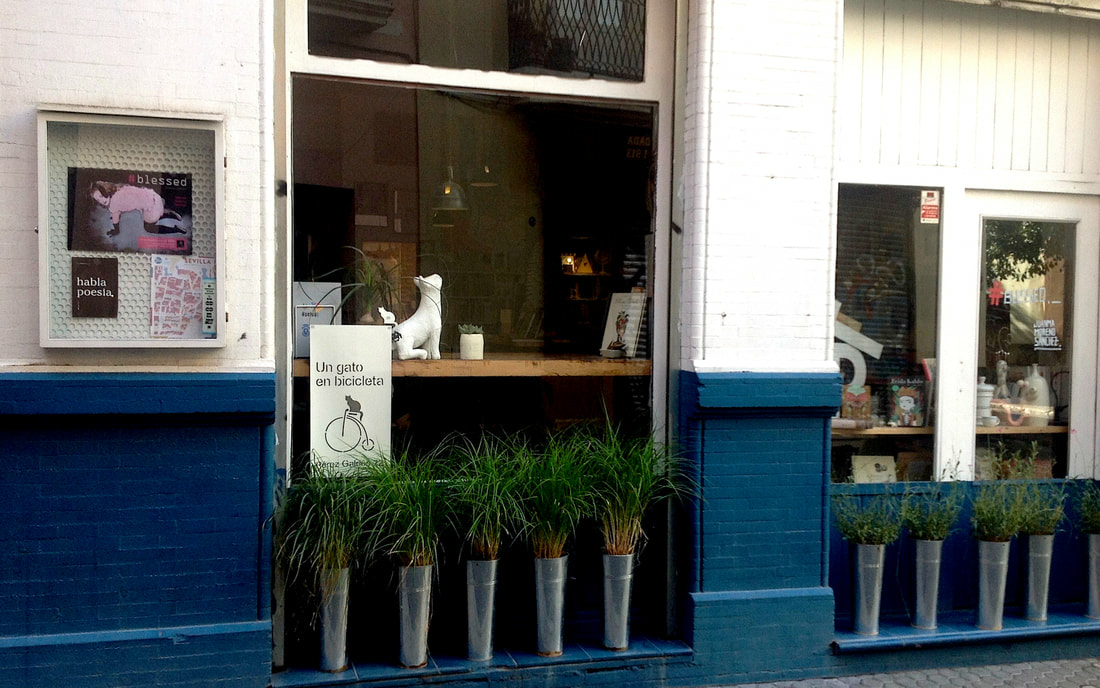|
Miriam Palma Ceballos
In the above, improbably-named bookstore, in Sevilla, Spain, its owner boasts of "Poetry Spoken Here." As opposed to "cat," or other exotic idiomas. I had sought refuge and become a semi-habitué there in the sweltering heat of an Andalucian autumn—95 degrees farenheit by siesta time. Indeed, siesta it was, every day: stores, even this one, shuttered and closed, then reopened in the evening as we all staggered out of our bedrooms, more or less refreshed. This place, tucked into the side streets of the old quarter, and presided over by owner Jésus Barrera, became, morning and often post-siesta times, a friendly workspace which offered light refreshment—coffee, tea, wine, tostados, shockingly rich cakes, even vegan delights—as well as conversations with interesting strangers, readings, food for the mind and soul.
And here, one mid-morning, thanks to Jésus, I met Miriam Palma Ceballos, a delightful woman, deceptively disguised as a proper academic in the German Department of the local university, a poet with a marvellous, skewed vision of the world around, before, and behind her. We are grateful for her generosity in allowing us to publish a sample of her poems from her collection, Exilios; Hacia el Azul, published in Spanish by Ediciones En Huida. About her work, Iván Onia Valero quotes the so-called angry man of Spanish letters, Francisco Umbral, from his book Carta a mi mujer : "envejecer no es abandonar las cosas, sino ir viendo cómo las cosas nos abandonan”. (Aging is not abandoning things, but seeing how things abandon us.) Now, Miriam Palma is no old lady, nor a suicidal adolescent who aspires to authorship; we are not so much speaking of loosening ties with life but with establishing proper relations with the very things that have stolen away from us. Onia goes on to explain that Palma "nos coge de la mano para bajar a los sótanos donde las cosas que nos abandonaron permanecen sonámbulas, y se hace necesario decirlas para consagrarlas al rito de la existencia o a la literatura del recuerdo." (loosely, Palma "...takes us by the hand, down into the basement where things that have abandoned us rest, like sleepwalkers, where they must be returned to routine existence or properly returned to the literature of memory.") Gratefully freed from the bondage of Anglophone literature's addiction to bourgeois "reality" and uniquely Spanish, Palma's fascination with memory, with the rearrangement (dare I say, in some cases, the "reanimation"?) of our material experience, leads the poet to daring metaphor and inspired vision. By way of our imperfect efforts, we offer you a mere taste of her work—alas for those who do not read Spanish, not yet translated into English— to entice you to clamor for more. Exilios
Azul*
*Whereas in English, we might think of blue (azul) as a color indicative of sorrow, Palma tells me, in Spanish it implies calm, tranquility.
Quizá Decíamos
|
|
quizá decíamos hambre
cuando dijimos hielo en los veranos que apretaban costuras de cuerpos zaheridos por certezas ajenas a ratos universos destemplados se contradecían mudos las constelaciones se destartalaban lentas sobre el costado de barrios casuales quizá decíamos hambre y queríamos ser boca |
perhaps we used to say hunger
when we said ice in the summers pulling tight the seams of bodies wounded beyond all reason From time to time ill-tempered universes, made speechless, slowly smashed constellations on the flanks of any old neighborhood perhaps we used to say hunger and we used to want to be a mouth |

